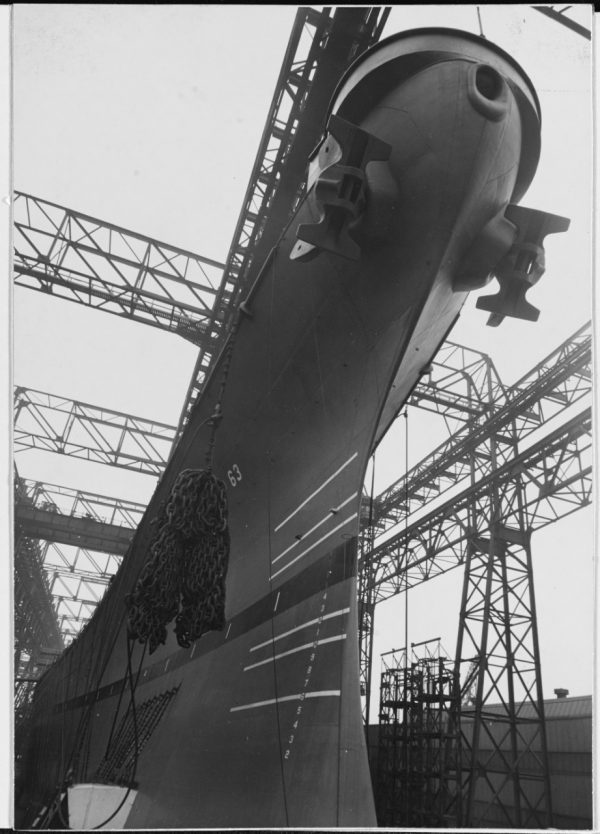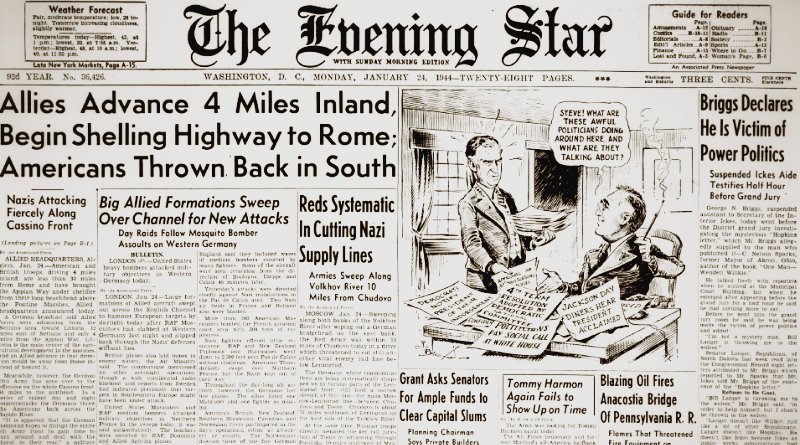World War II Chronicle: January 24, 1944
Click here for TODAY’S NEWSPAPER
Last year we discussed the refusal of the military governor of Hawaii to comply with a habeus corpus order. The front page reports that Pres. Roosevelt has unconditionally pardoned Lt. Gen. Robert C. Richardson Jr., who was operating under martial law and refused to produce two German Americans for trial when ordered by a civilian court. After graduating West Point (Class of ’04), Richardson was commissioned a cavalry officer and fought in the Philippine-American War. He was wounded in the campaign and earned a Silver Star. He then fought with the American Expeditionary Force in World War I and prior to his assignment to Hawaii was the Commanding General of the 1st Cavalry Division…
Senator Harry S. Truman’s daughter Margaret will christen USS Missouri when the battleship slides down the ways at Brooklyn Navy Yard this week. The keel for “Mighty Mo” was laid down a month after the Japanese attack on Pearl Harbor…

Alexander de Seversky aviation column on page seven… George Fielding Eliot’s column on the Italian campaign is on page eight… The Army Air Force has discharged Thomas Kincaid, a 16-year-old gunner with 300 hours of combat experience, after learning his age (see page 11)… Sports is on page 13, featuring a Grantland Rice golf column. Detroit Tigers first baseman Rudy York has been reclassified 1-A and may be headed for military service. The 30-year-old York led the American League in runs batted in last season (118) and paced the majors in home runs with 34…
Page 14 reports that Gen. Dwight Eisenhower will command all American fores in Europe. Maj. Gen. John C.H. Lee, former commanding general of 2nd Infantry Division, will serve as his deputy and recently promoted Lt. Gen. Walter Bedell Smith will be chief of staff… On page 21, six Marine Corps dogs have earned commendations for their service on Bougainville Island.
Roving Reporter by Ernie Pyle
IN ITALY — Our fighter and bomber pilots laugh about some of their accidental successes.
A light-bomber outfit was making a run with a brand-new replacement pilot, out on his first mission. Their target was very close to our own lines. As they were making their turn this new pilot lost formation and swung way out on the outside of the others.
Realizing his mistake, and seeing he was about to get left behind, he just salvoed his bombs and went streaking to catch up with the formation.
The squadron leader saw it and felt sure this neophyte had dropped his bombs on our own troops. When he got home he sat there by the telephone, sweating, waiting for the inevitable phone call.
Pretty soon the phone rang. A voice announced itself as Gen. So-and-so. The squadron leader’s heart sank. When a general phones it bodes no good. The General boomed:
“Say, who is that crazy pilot that left your formation and dropped his bombs off to the side?”
The squadron leader got ready to faint. He knew the next sentence would be that those bombs had killed 300 American troops. But instead the General shouted:
“Well, whoever he was, give him my congratulations. He got a direct hit on a gun we’ve been trying to get for two weeks. Wiped it off. Excellent work.”
Another time one of our artillery observers saw three big German tanks pull into a field several miles back of the German lines. The crews jumped out and began pitching straw over them, and in a few minutes they resembled a strawstack.
Not five minutes later our dive bombers came over. Their target was a gun position in an adjacent orchard. But their aim was bad, and their bombs landed directly on the three straw-covered tanks.
It was just an accident, but the Germans probably wonder what the world’s coming to when Americans can have planes blowing up your tanks five minutes after you’ve hidden them.
One time our dive bombers couldn’t find their principal target because of bad weather. They were on their way home when they picked up their alternate target, a supply dump at a crossroads.
The first plane dived in and dropped its bombs. Instantly a gigantic flame shot 1500 feet in the air. Before the last plane had finished its dive — a matter of only a few seconds — the pillar of smoke was 4000 feet high.
They really hit the jackpot, but they didn’t know what the jackpot was. They can’t conceive of anything that would flame that high so quickly.
Another time a pilot went out on a reconnaissance mission. Because of hazy weather, and because two adjacent passes in the mountains looked exactly alike, he took the wrong one and got lost, although he didn’t know he was lost.
He kept on flying by his map for a long time, although actually he was far north of where his map ran out. At last it began to dawn on him that something was wrong. Just as he was getting good and worried he looked down and directly under him was a field with a dozen or more small German planes lined up alongside the runway. So down he went in a surprise dive, set the German planes afire, and then headed rapidly south.
He found his home field just as he ran out of gas. When the boys asked where he’d been he didn’t know. It took the pilot and his squadron commander two hours of intense study of their maps to figure out what field he had shot up so beautifully. He had been 200 miles north of where he intended to be.
Evening star. (Washington, D.C.), 24 January 1944. Chronicling America: Historic American Newspapers. Lib. of Congress.
https://chroniclingamerica.loc.gov/lccn/sn83045462/1944-01-24/ed-1/
